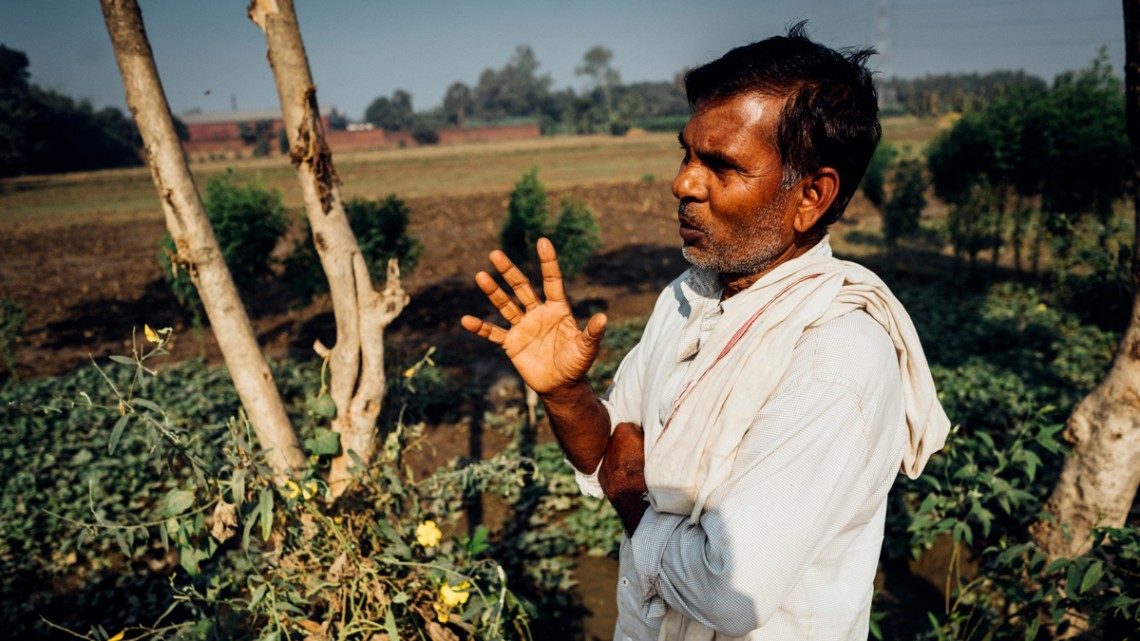
One of 13 portraits on display at Mann Library representing individuals in India who have worked with the Tata-Cornell Institute for Agriculture and Nutrition.
Tata-Cornell celebrates 5 years of fighting hunger in India
By Krisy Gashler
In Gujarat, India, more than half of women of child-bearing age are anemic. While India has made great strides in meeting its people’s need for calories, many still suffer from nutrient deficiencies, such as the low iron intake that causes anemia.
The Tata-Cornell Institute for Agriculture and Nutrition (TCI) is beginning to address the problem the same way it is addressing a host of problems in India: through innovative, community-based fieldwork that uncovers the failures in food systems, and then empowers communities to solve them.
This year, TCI is celebrating its fifth anniversary with a new exhibit, developed in collaboration with Mann Library, called “Portraits in Progress: Confronting Indian Malnutrition through Field-based Research Under the Tata-Cornell Institute.” The exhibit, which runs through Sept. 28, is made possible through the support of the Mary. A. Morrison Public Education Fund for Mann Library.
To combat malnutrition, TCI graduate students spend time living in rural India to engage with communities; doctoral students in the program are required to complete a year-long field study in the country.
In the U.S., disorders like anemia are kept at bay in part because bread and cereal manufacturers are required to fortify their flours with micronutrients such as iron and vitamin B12. But in rural India, flour production is not centralized or consistently fortified. With input from a host of partners, especially local women’s self-help groups, TCI developed small packages – also called sachets – of micronutrients consisting of iron, folic acid and vitamins A and B12. These packages can be purchased by householders and mixed into a variety of purchased or homemade flours. A single package of “Sfurti” (“healthy” in Gujarati) can be mixed with 5 kilograms of flour and meet an entire family’s needs for a week, for just 3 rupees, or less than a nickel.
Having student researchers live in these villages for an extended period of time is critical in helping ideas like Sfurti sachets gain community acceptance, said Prabhu Pingali, founding director of TCI and professor in the Charles H. Dyson School of Applied Economics and Management.
“We’ve spent two years promoting this system, working with women’s self-help groups and reaching individual women, who then take this knowledge back and inculcate it into their own communities,” Pingali said. “Now, the women have taken this on and they’re selling the sachets. So it’s improving not only the nutrition of the individuals, but also creating an economic opportunity for the women selling the sachets. Some of the women have even gone on to win local village elections.”
Other TCI efforts include a project to encourage people to plant vitamin A-rich sweet potatoes and to include it in infant diets; a partnership with AguaClara, a Cornell-developed clean water technology, that has installed clean drinking water systems in four villages in India; collaborations with universities to address soil health; community-based projects to improve grain storage, livestock feeding, crop diversity and household sanitation practices; and working to encourage Indian policymakers to focus on nutrient deficiency, not just hunger.
“We have dozens of examples showing how our work has helped individuals and transformed communities so far,” Pingali said. “In five more years, there will be over a hundred such examples across India and hopefully in other parts of the developing world.”
Tata-Cornell Institute was established in 2013 with a $25 million endowment from the Tata Education and Development Trust. The endowment was made possible by Ratan Tata ’59, B.Arch. ’62, chairman emeritus of the Tata Group.
The “Portraits in Progress” exhibit includes nine eight-foot-tall panels highlighting TCI’s projects, thematic areas and researchers. There are also 13 portraits representing individuals who have worked with and been served by TCI’s work in India.
Krisy Gashler is a freelance writer for the College of Agriculture and Life Sciences.
Media Contact
Get Cornell news delivered right to your inbox.
Subscribe
